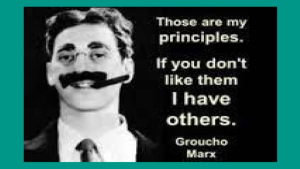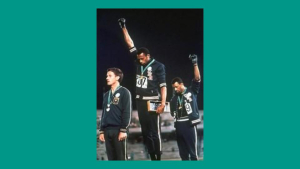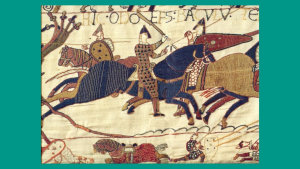We often consider courage as something relating to soldiers, in Australia that would be the ANZACs. That courage of a soldier to ‘go over the top’ and face almost certain death in the face of enemy fire. To those who did so in past conflicts, and also to our present day troops, we give thanks and honour.
But there are other forms of courage. The courage of a woman to marry. The courage of a woman to bear children (for even today many women suffer physical trauma and even death during childbirth). And there is a woman’s courage to raise those children. So we honour mothers.
Let us highlight the courage of conviction.

Well you may laugh, but how too often do we, who call ourselves Christian, are prepared to compromise the truths of our faith in the name of ‘tolerance’ or ‘social acceptability’? If we truly believe that Jesus is our God, and that His word is true, then why are we prepared to act like Groucho Marx in so many ways, often seemingly trivial, yet always displaying ourselves as hypocritical.
Why do we not stand by the principles and convictions of our faith? Let me give you an example of someone who did display strength of courage in his convictions.

Chesley Burnett “Sully” Sullenberger, III is a retired airline captain and aviation safety consultant. He was hailed as a national hero in the United States when he successfully executed an emergency water landing of US Airways Flight 1549 on the Hudson River off Manhattan, New York City, after the aircraft was disabled by striking a flock of Canada geese during its initial climb out of LaGuardia Airport on January 15, 2009. All of the 155 passengers and crew aboard the aircraft survived. After the crash, it was revealed that Sullenberger had left a library book titled Just Culture: Balancing Safety and Accountability in his luggage in the cockpit. Did he just shrug it off with a simple ‘Too Bad, I’m a hero who cares’. No, but because he was an honest man, who knew what the right thing to do was, he telephoned the library to notify them that the water-damaged book had been recovered, and that he would pay for the damage and the late fees (the library waived the usual late fees).
But what if your friends, colleagues and country turns against you for standing up for what you know is right.

Who recognises this picture? It was the presentation of medals for the men’s 200m final at the 1968 Olympics held in Mexico City. The 2 black-Americans used the occasion to promote human rights issues in the USA and world-wide by raising their arms in support of black power. They were highly criticised and ostracised for their actions, but were later vindicated and recognised for their courage.
But who was the other man on the dais, the white man? It had been expected that the Afro-Americans would make a clean sweep of this event, so who was this upstart white man who split the black domination and took the silver medal? He was an Australian, Peter Norman. On that day he had run the race of his life, his time is still the Australian record for the Men’s 200m. But he was also the son of a Salvation Army Minister and had strong Christian values. He believed that all men were created in the image of God and that therefore racial discrimination of any kind was abhorrent.
He knew the other men were planning to protest and his conscience permitted nothing less than his participation too. He wore a patch on his uniform in support of the civil-rights movement, and it was he who suggested the wearing of the black gloves. In fact, they were his gloves! You will notice that the third place-getter is wearing the left one.
Did everyone applaud his stance for human rights – No! He was ostracised by the Australian team and the Australian Olympic Committee. He was never again selected for the Olympics despite qualifying easily. His career was over, his life fell apart, then followed depression, divorce and drink. At the 2000 Olympics in Sydney every home medallist was recognised, except him. It was the USA team who took him in and honoured him. He was still a villain, his courage and conviction still vilified. He died in 2006 still an outcast in his native country for standing up for what is right. On 11 October 2012 the Australian Parliament passed the wording of an official posthumus apology that read:
| That this House:
(1) recognises the extraordinary athletic achievements of the late Peter Norman, who won the silver medal in the 200 metres sprint running event at the 1968 Mexico City Olympics, in a time of 20.06 seconds, which still stands as the Australian record; (2) acknowledges the bravery of Peter Norman in donning an Olympic Project for Human Rights badge on the podium, in solidarity with African-American athletes Tommie Smith and John Carlos, who gave the ‘black power’ salute; |
(3) apologises to Peter Norman for the treatment he received upon his return to Australia, and the failure to fully recognise his inspirational role before his untimely death in 2006; and
(4) belatedly recognises the powerful role that Peter Norman played in furthering racial equality
In a 2012 interview, John Carlos (the bronze medallist) said:
| “There’s no-one in the nation of Australia that should be honoured, recognised, appreciated more than Peter Norman for his humanitarian concerns, his character, his strength and his willingness to be a sacrificial lamb for justice”. |
San Jose State University put up a statue commemorating the protest, and they left Peter’s podium spot empty, intending for others viewing the statue to ‘take a stand’ and that is the spot visitors stand when having their photo taken. When tested, may we all have the courage to stand in Peter’s spot.
There are many such forgotten heroes. And there are many who have gone against their own people and paid the price, sometimes the ultimate price, and then slipped forgotten through the fingers of history. But these are the unknown soldiers who play an important part in bringing about change, or in maintaining those things of value in our society.
Pentecost is the day when we celebrate the giving of the Holy Spirit to us. The Holy Spirit is often referred to in the Scriptures as The Comforter. We often misunderstand this term. True, to be comforted is to have someone put their arm around you and say ‘there, there, it’s ok’. But really it is much more. It is to help us to be renewed, refreshed – made ready to stand up and move on again. Anyone heard of the Bayeux Tapestry?
It is a long tapestry made around 1070 AD to commemorate winning the Battle of Hastings by William the Conqueror.

This scene, from this monumental work, is of Bishop Odo of Bayeux ‘comforting’ the troops – with a quite vicious looking weapon. He is encouraging them to remain firm in their endeavours.
Likewise, the Apostle Paul in Ephesians Chapter 6, verses 10-17 encourages us to keep standing in our daily fight against evil in the power of the Holy Spirit. And we know that we will never be outcast nor abandoned, and there are many scriptures that give us that assurance . Fear not, take courage, and above all – stand!
